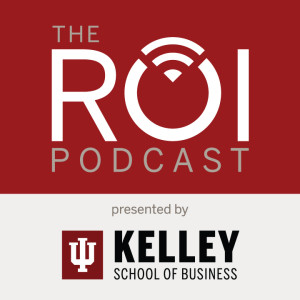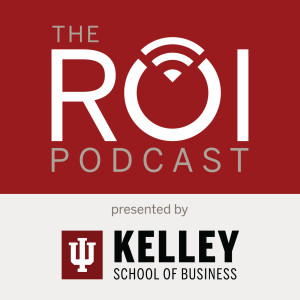
How many times have you set a timeline to get a task completed but fell short? Do you feel overwhelmed and distracted? In this episode of The ROI Podcast, Sunny Lu, CEO of Techserv, reveals three hacks that help her stay mind stay sharp every day.
----
Do you have a question? Looking to get help on a business decision? Know a great guest for our show? Email roipod@iupui.edu so we can help your organization make better business decisions.
----
Ready to take your next step? Check out if a Kelley MBA is right for you: https://bit.ly/3m2G6D5
----
Show Notes:
Sunny: What are you doing to maximize those minutes to achieve your goals and do you have a really clear plan.
(The ROI Podcast)
Shane: Happy… Whatever day it is that you are listening to this podcast! It is June in downtown Indianapolis and it doesn’t get much better than this. The sun is shining on us here at the IUPUI Campus and I’m thrilled to bring you this episode of The ROI Podcast. I’m riding solo today on this one, but we’re going to have a great time because we have a newly appointed CEO in this episode of The ROI Podcast! So I’m really pumped about that. But I want to start this podcast episode with a question for you: How many times have you set a goal, maybe it was something as simple as a New Year’s Resolution but found you never really hit that goal, or you lost sight of it? Well if you want to elevate your career, stick to goals you set, and accomplish more, then this episode is for you!
(Intro to podcast music)
Sunny: I would sum up my career by two key takeaways. It was the understanding of how to take a trial by fire, and make it an opportunity. Then secondly, comprehensive support from individuals who saw the potential in me, before I even realized I had the self-confidence to take the lead.
Shane: You just heard from Sunny Lu, CEO of Techserv, a solutions management firm specializing in program design, data management, and training for healthcare, corrections and education sectors… And Sunny has found time management to absolutely critical with what she does, and says it’s truly a skill everyone should develop – because it’s key to accomplishing your daily, weekly and quarterly goals…
Sunny: It is comprehensively about planning and scheduling your time. So I take one day a week, it doesn’t matter if that day is six hours, twelve hours or eighteen hours, but one day where I do all of my core documentation. When I mean core documentation I mean, “Does the company not already have a written plan, or some reference to written verbiage, that another team member can refer to get the work done. If that doesn’t exist, whether it’s a strategic plan, a project charter, an overall “This is my compelling pitch to a new customer,” if they don’t have that then they can’t really define the action items and next steps in order to move that particular piece forward. So I take a day. And sometimes over the past 45 days, that day has been close to 18 hours. Some days that day is very quick and there are the things I have to do and then move it forward. The rest of the days are all strategic meetings with the C-Suites that are in my core-customer group.
Shane: As some of you can probably imagine – and even relate to – you can’t just schedule a ton of different items if you don’t have the actual energy to perform the tasks, or enough energy to perform them at a high level… So, how do you optimize your energy on top of a really well-managed schedule? For ultra-successful entrepreneur Richard Branson, he’s been quoted as saying he can definitely achieve twice as much by keeping fit… And Sunny says she has found that to be the case for her.
Sunny: Train for a triathlon. So I say that literally and I say that tongue in cheek because I found my overall energy depleted over and over again when I was working for a corporation because I would have to drive these deadlines, I would have to make sure there was these particular pieces in place, and there were always these external consuming factors. When I was stressed and I didn’t have that overall time management, you just develop bad habits. So I looked at this and said, “If I’m going to be successful at running this business, it’s an endurance run. It’s a literal and figurative endurance run. I’m not just doing a sprint these 45 days, I’m going to do this for the duration until my exit strategy comes into being. I looked at it and said I needed to be healthier as a comprehensive package, in order to make sure I have the endurance and strength to get through it. I had run triathlons many, many years ago but like most busy and career professionals, I dropped off on the whole continues training and working out and being healthy, etc, in despite of all the key recommendations. I looked at it and at first it became this, “How do I do a conservation of energy plan for myself,” and make sure I’m at peak performance. And I was looking at doing some research and doing some education and seeing how I could become completely at peak. It’s the 90-day triathlon training plan. It’s really fascinating because when you look at that plan it’s really go to bed at a consistent, reoccurring hour every day, if you need to get stuff done then get up earlier. Eat well. Workout. And it’s not a run 10 miles everyday type of plan. It’s a build-up to go through endurance. I’m three weeks into that buildup and am I going to win that triathlon? No. But I’m definitely going to be in it to finish, and that’s the same endurance strategy for my business.
Shane: So it’s about physically being in shape, which in return gives you greater energy to perform the tasks at hand… And if there’s one thing that consistently exercising and training for a triathlon can teach us, it’s life and business lessons. You’ve all heard the saying, “Life’s a marathon, not a sprint.” And that holds true… So that’s our first takeaway: Keep your body in shape, and your mind will operate more efficiently. Now, we’re going to move into something that a lot of people deal with: Distraction: And Sunny has some great insights on how to keep focused to accomplish what needs to get done.
Sunny: Number one: Do not respond to emails all the time. Take a two-hour block, and it doesn’t matter if you need three two hour blocks in a day, but when you’re going to sit down to respond to emails, take a two-hour block when you are not distracted to respond to those emails. If you respond to emails all the time, all you are trying to do is clear your inbox and that is not the point of an email. An email is a documental reference point of communication and it’s important that it was written in this methodology for a reason. So you have to be just as concise, considerate and thorough so that you are not giving email action items back to your partners, customers, and suppliers. You are actually giving a thoughtful response via email – this is the strategy, the vision, the operations and overall plan. So that’s directional. If it’s too lengthy for an email, put it into a referenceable document, but that tactical two hours a day, whether you have to do it at 4:30 in the morning or 10 pm at night, do it where you are focused on the response.
Shane: Don’t check email all the time! Set specific times in your schedule to take care of that. Ok, number 2:
Sunny: The second thing I recommend tactically for my team is be absolutely protective of your time. Don’t take a call just to take a call. Don’t take a vendor request just to take a vendor request. Plan out your days thoroughly and thoughtfully. So I have program managers that run many projects and I say take the time to either space out your projects by day, so that you are actively having the headspace to actually think Wednesday is “X” customer day. And during “X” customer day, I’m going to be very thoughtful in this particular project, not just moving action items everyplace, but actually very thoughtful on “what are the actual responses I need to provide, what is the communication I need to put forth, and how do I facilitate and convene. That’s important because if you don’t have that time management and the accounting for schedule facilitation for your collaborators, nobody else is going to do that. And that’s how we move our business so quickly forward.
Sunny: I often joke that executives are just master schedulers. Right? How do you get done everything you need to get done in the right format and in the right methodology and the right communication if you haven’t accounted for what time you will need the right headspace to approach, resolve, and potentially lead certain things.
(Closing Music)
Shane: So we’ve talked about be a master scheduler, not checking your emails every single second, which is ultimately a distraction and can throw you off the task that needs to get done, but Sunny’s last piece of insight that’s truly helped her throughout her journey to the C-Suite is one of my favorites.
Sunny: The last and final is if you take accountability, don’t make excuses to me on why you didn’t make your timeline, because you are the one that set the timeline. For many companies, that’s not feasible. We are designing the program, and therefore, we are designing the implementation timeline, getting the messaging back from the customers, to say, “Does this makes sense?” Are their conflicts because of other trainings, other initiatives, etc. So, if we cannot make a timeline, there has got to be a process, a root cause to it, there’s got to be a communication root cause to it, so as long as that’s appropriately communicated we don’t have issues.
(The ROI Podcast Music)
Shane: So there you have it! Your goals are much more attainable than you think – but it’s going to require discipline and focus – and both of those can be hard to keep in our information-crazed society… So remember what Sunny mentions – schedule your time, be precise, exercise because it’s going to help you think better and focus, don’t watch your email like a hawk… Set designated times to check and give the best response possible – and finally accountability! Follow these steps, practice them, and reap the rewards… That’s going to wrap up this episode of The ROI Podcast presented by the Kelley School of Business. We want to thank Sunny Lu of Techserv for visiting with us and sharing her insights. Don’t forget to subscribe and leave us a review on the podcast! And we’ll be here next week with another episode… Take care!
More Episodes
 2019-04-15
2019-04-15
 2019-03-05
2019-03-05
Create your
podcast in
minutes
- Full-featured podcast site
- Unlimited storage and bandwidth
- Comprehensive podcast stats
- Distribute to Apple Podcasts, Spotify, and more
- Make money with your podcast
It is Free
- Privacy Policy
- Cookie Policy
- Terms of Use
- Consent Preferences
- Copyright © 2015-2024 Podbean.com






